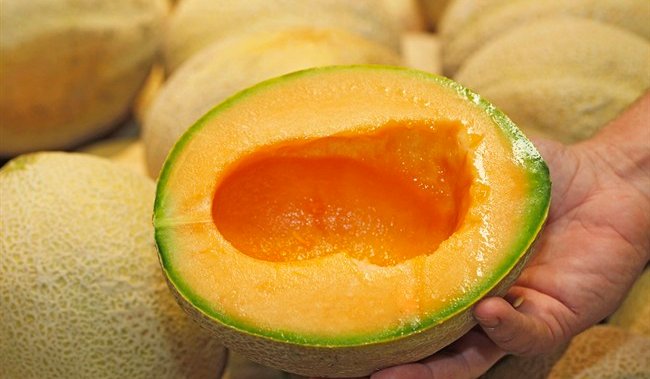An unspecified number of people have become ill from salmonella-contaminated cantaloupes, the Canadian Food Inspection Agency said Friday.
The agency is recalling Malichita, Save on Foods and Urban Fare brands of cantaloupe products, including not only whole melons but pre-cut chunks, fruit salads and platters containing the fruit.
The reported illnesses are linked to the Malichita cantaloupes, the food inspection agency said in an updated food recall warning published Friday.
The BC Centre for Disease Control’s website currently lists eight confirmed cases in British Columbia.
And Public Health Ontario confirmed in an email that one case has been identified in that province.
“The outbreak investigation is still ongoing, so cases may continue to be confirmed,” the email said.
The affected Malichita cantaloupes were sold between Oct. 11 and Nov. 14, inclusive, the Canadian Food Inspection Agency said.
It said the affected Save on Foods and Urban Fare products have best-before dates up to and including Nov. 9.

The Malichita cantaloupes were sold in British Columbia, Alberta, Manitoba, Ontario, Quebec, Nova Scotia, New Brunswick, Prince Edward Island and Newfoundland and Labrador and “possibly other provinces and territories,” the food inspection agency said.
The Save on Foods and Urban Fare products were sold in British Columbia, Alberta, Saskatchewan, Manitoba and Yukon, it added.
Consumers should throw out any affected products, the food inspection agency said, noting food contaminated with salmonella “may not look or smell spoiled but can still make people sick.”
“If you think you became sick from consuming a recalled product, contact your health-care provider,” it said.
Symptoms usually start between six and 72 hours after exposure. They can include chills, fever, vomiting, diarrhea, stomach cramps and a sudden headache.
Most people recover on their own within a week, but some may get more seriously ill and require hospitalization.
Young children, seniors and people with weakened immune systems are at higher risk of serious illness from salmonella.

There have been five major salmonella outbreaks in cantaloupes in Canada and the United States over “the last decade or so,” said Lawrence Goodridge, professor of food safety at the University of Guelph.
“The cantaloupe can become contaminated when the melons come in contact with manure or soil or compost or water that contains salmonella” while it’s growing, Goodridge said, adding contamination often stems from animals and birds defecating on the field.
It can also happen while the cantaloupes are being processed, he said. Although they are usually washed in chlorinated water, the rough texture of the skin can make it “difficult” to clean the bacteria in the crevices.
Salmonella on the surface gets inside the cantaloupe when it’s cut, Goodridge said.
“The flesh is a very good place for bacteria to grow because there’s lots of water, there’s lots of nutrients and the pH is around neutral,” he said.
It’s possible to become infected from handling the outside of the cantaloupe if there’s a high concentration of salmonella on the skin and the person then touches their mouth or other raw food, he said, but most salmonella illnesses are caused by eating the cantaloupe itself.

Although people should throw out the cantaloupes affected by the current recall, Goodridge noted they can also take steps to reduce their risk of salmonella from eating cantaloupe in general.
The melons should be washed under running tap water while the thick outer skin is scrubbed with a brush, he said.
If the cantaloupe is too heavy to hold with one hand while scrubbing with the other, people can put it in a colander and brush any dirt off, then pour boiling water over it, he said.
Cantaloupe should also be kept in the fridge to prevent bacteria growth, Goodridge said.
© 2023 The Canadian Press


